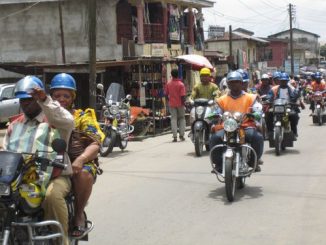By John Leigh*
Thursday April 6 , 2006
The recent arrest, transportation, detention and arraignment of Liberian ex-President Charles Taylor at the UN-backed Special Court in Freetown, are a most welcomed development in the on-going struggle to come to grips with warlord impunity, the criminalization of state power and answering the cry of the people of Africa for justice.
On the other hand, the current chorus of calls to have Taylor’s forthcoming war crimes trial transferred to The Hague is misguided because transferring Taylor’s trial to Europe would defeat a cardinal reason underpinning the establishment of the Special Court.
A key objective in setting up the court to try those most responsible for war crimes in Sierra Leone is to teach Africans first hand in their own country, the fundamentals of true justice – procedural and substantive – and to drive home the fundamental democratic principle that no one is above the law; with each person, no matter how high his position in society, shall be held accountable for his/her unlawful deeds.
Demonstrating the proper administration of justice in a country widely known for its kleptocratic elite, military elements notorious for unspeakable brutality and prone to subject females to sexual servitude; and where might is deemed right is probably unbeatable as a nation-building tool. The actual practice of accountability, transparency, fairness, objectivity in securing indictments against genuinely culpable persons only and treating each and every defendant humanely and with dignity, are fundamental democratic principles that African leaders must learn to live by.
These are the things the Special Court was set up to inculcate into the thinking processes of us Sierra Leoneans, and which the Court has sought to accomplish since it commenced operations in late 2002.
Should the trial of Taylor, the prime defendant among those charged with war crimes, be transferred to the distant Hague for trial, these key benefits would be lost to the people of Sierra Leone and her neighbors – benefits sorely needed to help countries such as Sierra Leone and Liberia move forward with genuine democratic nation-building.
As it is, our country is still unstable, reeling from the consequences of Taylor’s war. Additionally, it continues to suffer from poor governance, deep poverty and shocking superstitions – the very weaknesses that Taylor exploited in crafting his plunder of Sierra Leone and Liberia. The lessons being taught by the on-going war crimes trials are still insufficient to generate lasting benefits to the people of the region.
Transferring the trial of the most notorious defendant to far away Netherlands would render worthless the little that has been learned so far. Absent the effective containment of impunity and the criminal abuse of state power, nation-building efforts in several locales in Africa, including Sierra Leone, will be stymied for years to come.
By learning live the benefits of properly administered justice, we Sierra Leoneans are better able to protect our rights, deal more effectively with abusive authority, reduce our reliance on superstitious beliefs and thus better able to develop our countries on sound democratic principles. Our leaders, civilian and military, observing firsthand how one of their own is compelled to account before the bar of justice for his crimes in plain view of his victims, may be better able to behave themselves by understanding the consequences of unconscionable wrongdoing.
Furthermore, it also does not seem right to have the real king pin among the defendant war criminals spirited away to Europe while his fellow accused are held back to be tried locally. Taylor’s proposed transfer from Sierra Leone to The Hague will in itself inflate his prestige among those prone to violence since his admirers would conclude that the whole world deems Taylor as too big a fish to be tried locally.
This situation could easily be misconstrued by his supporters to mean that the more abusive one is the more respect he garners from the international community.
To such people, Taylor’s transfer abroad would seem like favored treatment, specially concocted for the benefit of the most brutal of warlords out of perverse respect for the extreme horrors he perpetrated. Popular perception in Africa is that conditions abroad are a lot superior to those at home. Such pandering may even embolden some of his supporters into believing that the international community deems Taylor to be a demigod who still retains the power to watch over them should they decide to unleash another reign of terror.
In order to drive home the true benefits of properly administered justice, Taylor, like his fellow war criminal defendants, should be held in the same humid place of detention, eat the same food and tried by the same judges in the same courthouse nearest the scene of his crimes. All this, of course, should be done in plain view of his victims, the corrupt members of the elite and our military brutes.
Taylor’s attorney, Mr. Vincent Nmehielle, wants the court to believe that Taylor would like to be tried in Sierra Leone. Those of us who are familiar with Taylor’s tactics know better: Taylor is faking it. Taylor would rather be in Europe, as far away from his victims as possible. By pretending he wants to be tried in Sierra Leone, Taylor is hoping that the court would deny his request and, instead, be more motivated to ship him to Europe.
As an ?escapologist’, Taylor knows he is better off in Europe than in Sierra Leone where thousands of people are literally looking for the opportunity to administer vigilante justice. Taylor knows that any escape from the protection of the United Nations detention facility would most likely result in a self-imposed death sentence. Taylor also knows it would be a lot safer to attempt escapes in Europe in case of any failed attempt.
Fears that Taylor’s trial in Freetown may cause instability in Sierra Leone and Liberia and even elsewhere in the sub-region clearly have substantial merit. There are thousands of ex-combatants, including many Taylor loyalists and admirers, walking the streets and byways of Sierra Leone, Liberia and Ivory Coast. Some even hold lawful public office in Liberia. Many of these people are disenchanted with the status quo. It is quite possible that a number of them may get violent again once the trial date approaches.
But the solution is not to rob Africans of the benefits of experiencing real justice administered live involving their most powerful tormentor in front of their eyes in their own backyard; nor should Africans be prevented from seeing a fearsome warlord-president compelled to account for his crimes and learning key principles of justice and democracy from such a novel experience.
It is also not fair to deny the people the hope that our civilian and military leaders, too, are getting an education from Taylor’s in-country trial as the same thing could happen to them should they step out of line in any significant way.
The appropriate solution to the instability issue is to tighten security in both Sierra Leone and Liberia under a robust UN peacemaking mandate rather than pander to thuggish elements by shifting the trial venue to a far away place. Then let those who believe that they are above the law rear up their ugly heads once again and be dealt with under the rules of civilization.
Already, during the first two years of this Millennium, the United States most graciously spent approximately $100 million to train at least seven ECOMOG battalions to help secure the peace in Sierra Leone. In addition, there are a British Military Mission and British-trained security forces in Sierra Leone, plus 15,000 UN Peacekeepers in Liberia. It is clear that the benefits of trying Taylor in Freetown, including teaching Africans and their leaders firsthand the proper administration of justice far outweigh the costs of activating internationally-trained security forces to help maintain short term stability.
I submit, therefore, that Freetown is certainly the appropriate venue to hold Taylor and his fellow accused war criminals accountable for their egregious crimes against the people of Sierra Leone.
Rather than concerning themselves with trying Taylor in Europe, world leaders should consider doing FOUR things:
(i) Get active immediately in securing a suitable place for the long term incarceration of Africa’s most notorious warlord should he be convicted because Sierra Leone is going to remain a weak and a relatively unstable state for some time to come unless a sea change in governance standards and practice occurs soon.
(ii) Send forth the word to those officeholders and others in Liberia who threaten to make trouble for the duly elected government face investigation and possible indictment for war crimes, crimes against humanity and violations of international humanitarian law.
(iii) Consider making the Special Court as the permanent African branch of the International Criminal Court because teaching Africans the means and ways of genuine justice cannot be based on an ad hoc Special Court that depends on voluntary funding.
(iv) Press the Sierra Leone Government to institute civil legal action in a suitable democratic country abroad on behalf of war victims and those who lost property as a result of war action for loss of life, bodily injuries, violation of civil rights, pain and suffering as well as for damage, destruction or the plunder of property, against those who profited from the war.
I had done work on instituting civil action in Washington but shortly after my recall as ambassador, the law firm that had agreed to represent Sierra Leone suddenly withdrew from the case, allegedly because of corrupt demands. Sierra Leone’s war damage claims are still viable and ought to be pursued if victims are ever to gain closure in this matter. Thank you.
Dated: April 5, 2006 E-mail: johnernestleigh@yahoo.com




Leave a Reply